Difference between revisions of "Factories"
(Created page with "<div id="content_view" class="wiki" style="display: block"> ==Industrial Wheeling== <div id="toc"> =Table of Contents= <div style="margin-left: 2em">[#x-Industrial Wheelin...") |
|||
| Line 2: | Line 2: | ||
==Industrial Wheeling== | ==Industrial Wheeling== | ||
<div id="toc"> | <div id="toc"> | ||
| − | + | Wheeling's past prominence was based on a confluence of transportation routes to the West. The Ohio River, the National Road, the Baltimore & Ohio Railroad, and the Suspension Bridge all brought many people to and through Wheeling.<br /> <br /> What made manufactoring successful here - was it transportation that made it easy for raw materials to come in and finished products to go out? The abundance of coal as a cheap energy to run factories? Or maybe an entrepreneurial spirit that anything was possible? The transportation advantage is still here but the coal and the can-do attitude are mostly gone. In any case, Wheeling became a major manufacturing center in the second half of the 19th century and many fascinating industrial buildings remain to mark that heritage. Here are some images from a 1936 Wheeling Chamber of Commerce brochure promoting Wheeling as the ''Workshop of the Central West.'' Following that is a growing list, first of names of factories, and then photos and text to document them.<br /> [[Image:WhlFactories-ChCom~1936SM.jpg|WhlFactories-ChCom~1936SM.jpg]][[Image:Industry1-ChCom-1936sm.jpg|Industry1-ChCom-1936sm.jpg]][[Image:Industry2-ChCom1936sm.jpg|Industry2-ChCom1936sm.jpg]][[Image:Industry3-1936ChComSM.jpg|Industry3-1936ChComSM.jpg]][[Image:MapWhl-1936sm.jpg|MapWhl-1936sm.jpg]]<br /> I would be happy to learn the identification of any of these factories (and their locations). The map indicates how central Wheeling was felt to be in 1936.<br /> <br /> | |
| − | + | ==[[Bloch%20Brothers%20Tobacco%20Company|Bloch Brothers Tobacco Company]]== | |
| − | ==[ | + | [[Central%20Glass%20Company|Central Glass Company]]<br /> |
| − | [ | + | ==[[15th%20Street|Hazel Atlas Glass Company]]== |
| − | ==[ | + | ==[[Reymann%20Brewery|Reymann Brewery]]== |
| − | ==[ | + | ==[[Schmulbach%20Brewery|Schmulbach Brewery]]== |
| − | ==[ | + | ==[[19th%20Street|Sterling Drug Building]]== |
| − | ==[ | + | ==[[19th%20Street|Red Factory]]== |
| − | ==[ | + | ==[[Warwick%20China%20Co.|Warwick China Co.]]== |
| − | ==[ | ||
- 22nd & Water St | - 22nd & Water St | ||
| − | ==[ | + | ==[[Iron%20%26%20Steel|Iron & Steel]]== |
| − | ==[ | + | ==[[Oil%2C%20Gas%20%26%20Coal|Oil, Gas & Coal]]== |
<br /> | <br /> | ||
---- | ---- | ||
| − | + | </div> | |
Latest revision as of 19:55, 23 April 2018
Contents
Industrial Wheeling
Wheeling's past prominence was based on a confluence of transportation routes to the West. The Ohio River, the National Road, the Baltimore & Ohio Railroad, and the Suspension Bridge all brought many people to and through Wheeling.
What made manufactoring successful here - was it transportation that made it easy for raw materials to come in and finished products to go out? The abundance of coal as a cheap energy to run factories? Or maybe an entrepreneurial spirit that anything was possible? The transportation advantage is still here but the coal and the can-do attitude are mostly gone. In any case, Wheeling became a major manufacturing center in the second half of the 19th century and many fascinating industrial buildings remain to mark that heritage. Here are some images from a 1936 Wheeling Chamber of Commerce brochure promoting Wheeling as the Workshop of the Central West. Following that is a growing list, first of names of factories, and then photos and text to document them.
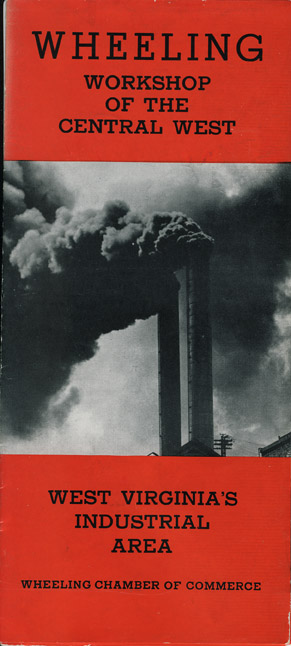
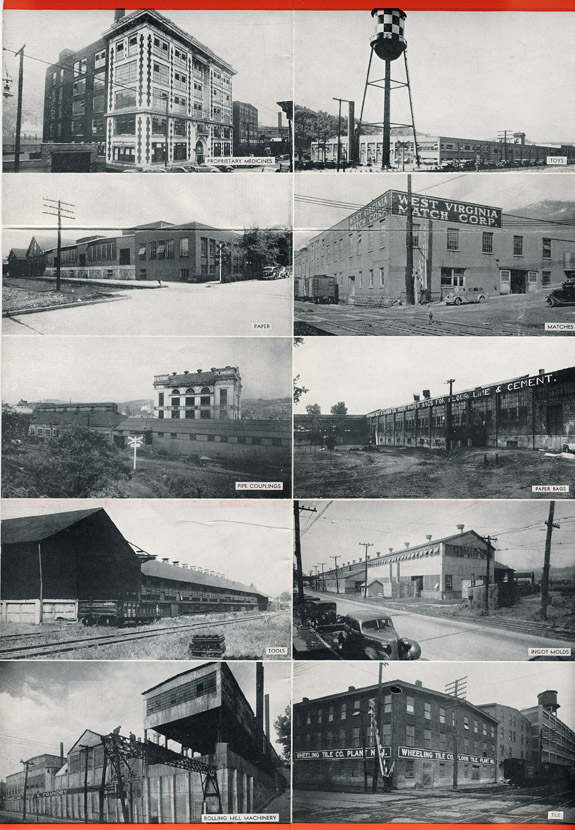
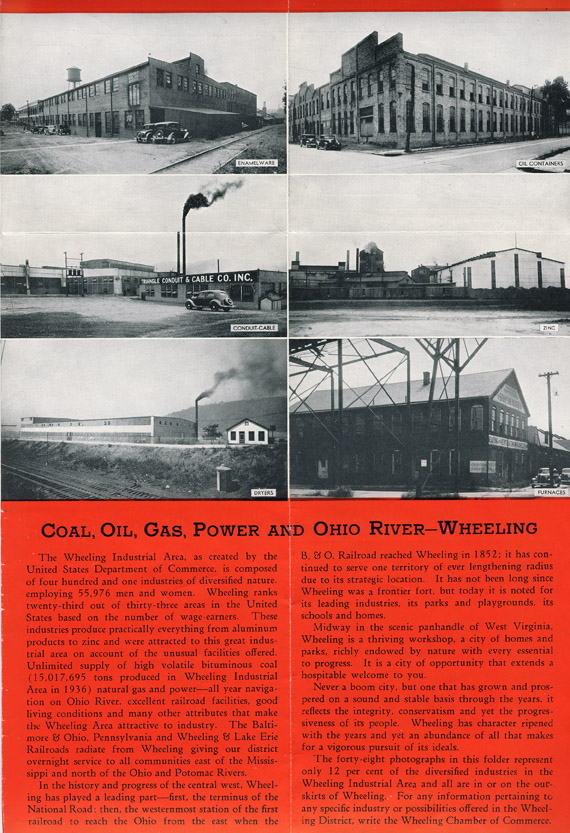
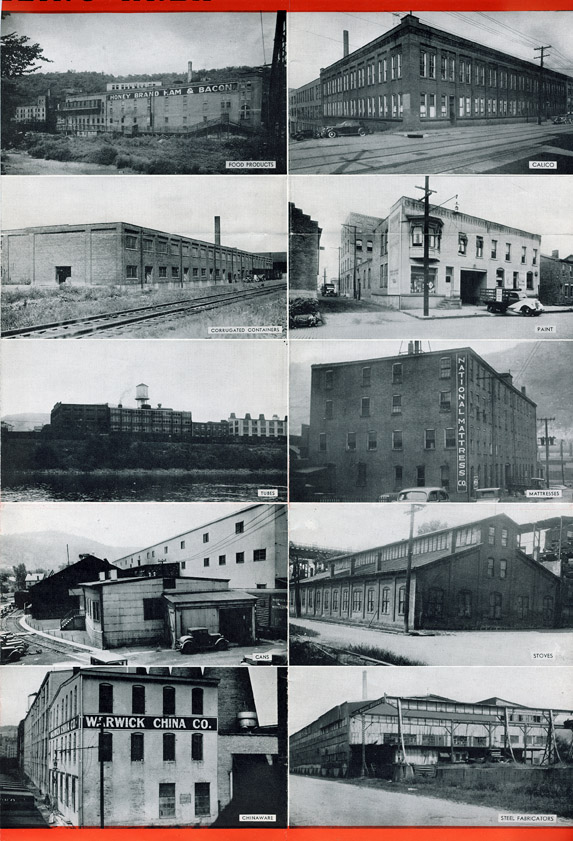
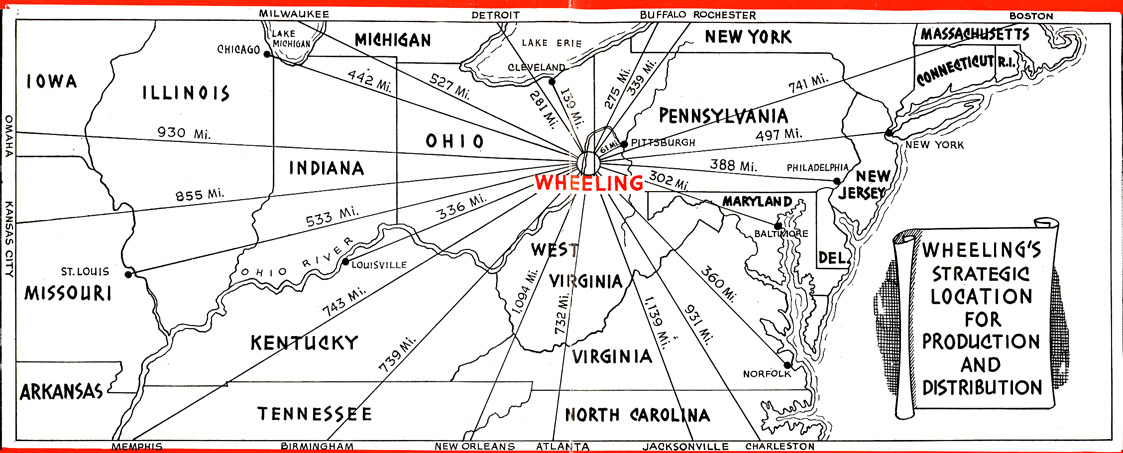
I would be happy to learn the identification of any of these factories (and their locations). The map indicates how central Wheeling was felt to be in 1936.
Bloch Brothers Tobacco Company
Hazel Atlas Glass Company
Reymann Brewery
Schmulbach Brewery
Sterling Drug Building
Red Factory
Warwick China Co.
- 22nd & Water St
Iron & Steel
Oil, Gas & Coal